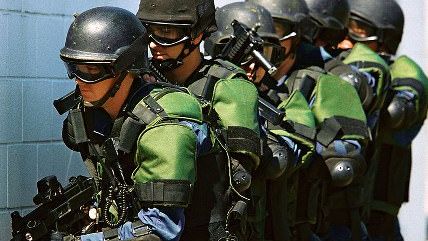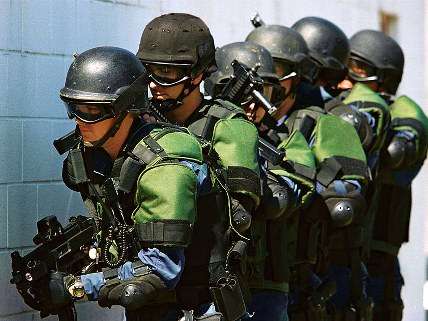The Madness of Law Enforcement's Escalating Brutality
It's a spiraling descent into insane tactics as frustrated law enforcers face-off with a non-compliant population.


Law enforcement excesses grab an ever-growing share of headlines. Doors kicked in, people killed, dogs shot, phone lines tapped, curfews imposed—they're all examples of official overreaching at that unpleasant intersection of private activity and state disapproval. For some people, the implication of such abuses is that more scrutiny and the right people in charge will make law enforcement an enterprise which people need not fear.
But what if that's not the case? It may be that lawmakers have assigned law-enforcers goals so frustratingly elusive that even angels couldn't resist the temptation to escalate tactics to insane extremes, trampling liberty and decency along the way.
Deranged escalation resulted in the misguided marijuana raid on the home of Berwyn Heights, Maryland, Mayor Cheye Calvo, during which his dogs were killed. When even a government official like Calvo can't protect his pets from police overstepping, you know we've gone over a cliff.
A similar venture into law enforcement madness resulted in the death of one police officer, and injuries to five others, when Ogden, Utah, resident, Matthew David Stewart, defended himself against the home invasion. Stewart later hanged himself in jail when it became clear that the legal system wasn't about to admit police errors or recognize his right to self-defense.
But that leap into the void was probably inevitable given the government's obsession with achieving the impossible: eliminating marijuana consumption. Almost eighty years after Reefer Madness, decades into the War on Drugs, a 2008 survey by the World Health Organization still says that 42.4 percent of Americans have smoked grass.
After several consecutive lifetimes of failure, entering the homes of average citizens and even of low-level government officials with guns blazing because somebody tried to grow marijuana or just deliver a package of forbidden weed to an unsuspecting addressee may suddenly take on a false patina of sanity to prohibitionists driven mad.
In fact, there have been a lot of laws that are essentially unenforceable because a large segment of the population is unwilling to obey them. They involve activities in which there's no victim—nobody to file a complaint or cooperate with police.
The hidden secret of law enforcement is that it's largely dependent on public cooperation. When laws have less than near-universal support—when they're a majority preference jammed down the throats of the minority—they beg for defiance. Cops then are "forced" to become arm-twisters, trying to intimidate the minority into submission through increasingly brutal tactics, or else they just give up.
Prohibition is infamous on this count. Thirteen years of illegal liquor brought us mass disobedience, corruption, and organized crime. A paper prepared in 1972 for the National Commission on Marihuana and Drug Abuse concluded, "[t]he law could not quell the continuing demand for alcoholic products. Thus, where legal enterprises could no longer supply the demand, an illicit traffic developed, from the point of manufacture to consumption."
You'd think that history lesson would stick—but it hasn't. Lawmakers still send the police to force people to stop doing things they want to do, even when there's nobody to complain and little interest in compliance.
So we see police breaking up friendly card games with headline-grabbing raids, like the Largo, Florida, incident in December 2012 that involved cops in riot gear bursting in on a poker tournament that involved no actual gambling. Of course, the games continue, only now a bit further underground.
People turn to the Internet for their gambling fix. What's the government going to do about that?
Try something else crazy, it turns out—like arresting executives of companies based in countries where online gambling is perfectly legal who merely change planes in the United States. That's like Saudi Arabia busting a Fleshbot employee because naughty pictures published on American Web sites are frowned on in Islamic countries.
That enthusiasm for enforcing the unenforceable at all costs should have all of us—even gun control advocates—thanking the Supreme Court for (apparently) taking outright gun bans off the table with the Heller decision.
Why?
Because gun owners have a history of defying gun control laws (compliance with assault weapons bans in Boston and Cleveland has hovered around one percent). Because the authorities would be inclined to escalate enforcement. And because resistance to such escalation would inherently involve, you know, guns.
In Can Gun Control Work? James B. Jacobs, director of the Center for Research in Crime and Justice at New York University, concluded, "If black market activity in connection with the drug laws is any indication, a decades-long 'war on handguns' might resemble a low-grade civil war more than a law-enforcement initiative."
And that takes us back to drug prohibition—the eternally failed crusade to make much of the population change its ways, "or else."
It won't work. It can't work. It never has worked.
But the authorities try, and try, and try to make people knuckle under to laws that they find offensive and intrusive. And as people refuse to comply, the authorities raise the stakes, adopting tactics that most of us recognize as violations of fundamental rights and of simple human decency.
A version of this column earlier appeared in newspapers including the Verde Independent.


Show Comments (52)